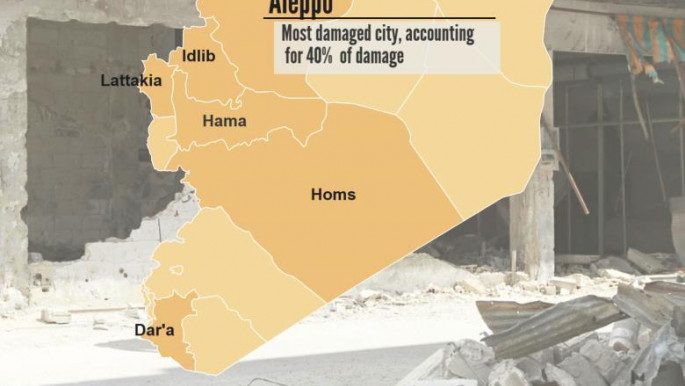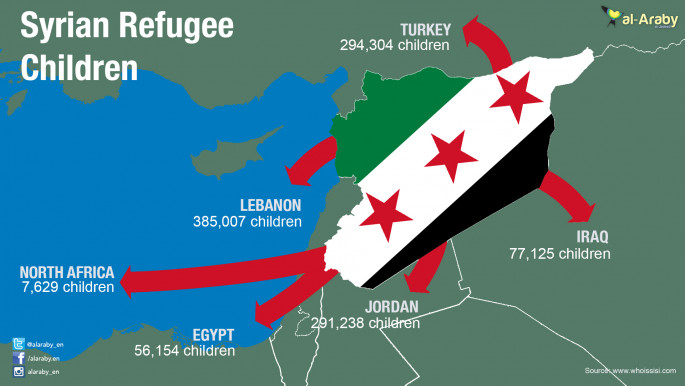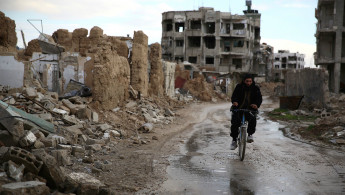The Syrian war has cost $35bn - so far
The devastating economic impact of the five-year war in Syria and its spillover into nearby countries stands at $35 billion, with the figure rising, the World Bank has revealed.
The estimate, included in a quarterly World Bank report on the Middle East and North Africa, was released on the same day that world leaders in London pledged more than $10 billion through 2020 to help Syrians.
Around 260,000 people have been killed in the conflict since March 2011. More than 50 percent of Syria's population is displaced, while 13.5 million people are in urgent need of humanitarian assistance inside Syria.
More than four million Syrian refugees are located in just five countries - Turkey, Lebanon, Jordan, Iraq and Egypt - where authorities now face immense pressure.
Turkey is hosting 2.5 million refugees from Syria, more than any other country worldwide, while tiny Lebanon accommodates approximately 1.1 million - boosting its pre-war population by more than 25 percent.
Jordan is home to around 635,324 refugees from Syria, amounting to about 10 percent of its population.
Iraq, in which 3.9 million people are already internally displaced, 245,022 Syrian refugees are aso being hosted, while Egypt's numbers stand at 117,658, according to the latest UN figures.
The Syrian war and its effect on Turkey, Lebanon, Jordan, Iraq and Egypt "have cost close to an estimated $35 billion in output", the World Bank said.
All of Syria's neighbours "are facing tremendous budgetary pressure" because of the conflict, the report said.
Jordan at boiling point
The influx of so many Syrian refugees has cost Jordan more than $2.5 billion a year, which amounts to six percent of GDP and a quarter of the kingdom's annual revenues, the World Bank found.
In 2016 alone, the refugees will cost Jordan a further $2.7 billion, according to Amman.
Jordan's King Abdullah II on Thursday warned his country was at "boiling point".
"Sooner or later, I think, the dam is going to burst," he said, pointing to strains on employment, infrastructure, education and healthcare.
 |
In 2016 alone, refugees will cost Jordan $2.7 billion, according to Amman |  |
The influx has overwhelmed the resource-poor country of 9.5 million people - including migrants and refugees - much of which is desert.
"Jordan can no longer continue to provide aid to Syrian refugees without long-term international assistance," said Imad al-Fakhoury, Jordan's planning minister. He warned the kingdom could be "forced to take painful measures that will lead to a greater influx of refugees to Europe if Jordan is left on its own to deal with the consequences of the Syria crisis".
High unemployment in Lebanon
Around 70 percent of Syrian refugee families in Lebanon are living significantly below the Lebanese poverty line, and the UN's humanitarian response has been consistently underfunded.
Last year, the UN only received 57 percent of the funds it requested for its work in Lebanon.
"Unemployment is high among refugees, especially women, and those who do work often work in the informal sector with no protection," said Shanta Devarajan, World Bank chief economist for the Middle East and North Africa.
"About 92 percent of Syrian refugees in Lebanon have no work contract and more than half of them work on a seasonal, weekly or daily basis at low wages."
 |
The World Bank Group is working on measures to provide $200 million in concessional financing to help create jobs and increase access to education in Lebanon and Jordan |  |
To support the countries hosting large numbers of refugees, the World Bank Group said it was working on measures to provide $200 million in concessional financing to help create jobs and increase access to education in Lebanon and Jordan.
 |
|
"We're determined that our resources will be put to immediate and long-lasting use," said World Bank Group President Jim Yong Kim, "to create jobs, to educate children, and to provide economic opportunities for both Syrian refugees as well as their generous hosts in Jordan, Lebanon and Turkey."
Destroyed infrastructure
The World Bank also found that the total economic damage of six cities in Syria, including Idlib, Hama and Homs, accounted to over $3 billion.
Aleppo was the most damaged city, as years of regime bombardment of rebel-held areas have decimated the infrastructure of this once bustling and modern city.
Communications networks, power and water supplies - in addition to schools and other educational institutions - have all been severely damaged by the ongoing fighting.
The war has not only devastated signs of modern life in Syria's second city, but has also wrought havoc on its historical and cultural landmarks.
The covered souk of Aleppo once contained more than 5,000 shops, and was listed as the world oldest covered market. It was destroyed by the battles that raged in the city.
Regime bombardment also destroyed the minaret of Aleppo's Grand Mosque, which was constructed in the Umayyad period under the reign of Sulayman bin Abdul Malik in the 8th century.
Fighting between opposition and regime forces has also destroyed numerous other historic sites in Aleppo's old city, reducing hundreds of years of exquisite architecture and history to rubble in a matter of minutes.
 |



